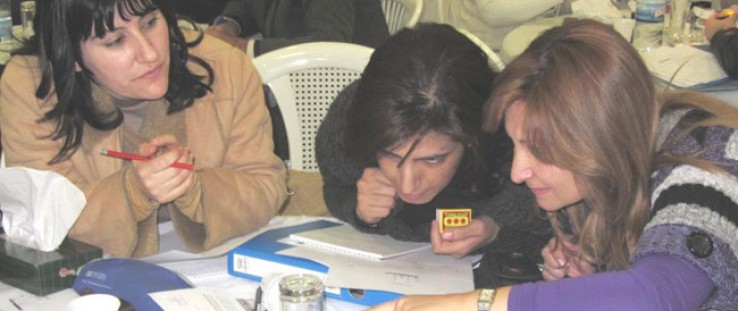 Teachers participate in classroom observation training at the American University of Beirut, Dec. 16, 2011.
D-RASATI/EDC
Teachers participate in classroom observation training at the American University of Beirut, Dec. 16, 2011.
D-RASATI/EDC
 Teachers participate in classroom observation training at the American University of Beirut, Dec. 16, 2011.
D-RASATI/EDC
Teachers participate in classroom observation training at the American University of Beirut, Dec. 16, 2011.
D-RASATI/EDC
At age 14, Malek Haidar, a public school student in Lebanon, was on the verge of dropping out. “I skipped school any chance I got,” he says.
When one of USAID’s education programs organized after-school activities as part of a larger effort to improve the learning environment, however, he got involved in a school play and became motivated to do well in the classroom. “I would have never imagined a different life before, but now I know that, with hard work and education, I can do whatever I want to with my life,” said Malek after his participation in the after-school program. Two years later, Malek is more enthusiastic about school, and has successfully finished his intermediate school studies at Hawch El Omarah public school.
Before the 1975-1990 civil war, Lebanon boasted a proud and well-regarded public school system. After the conflict, however, resources and political attention withered and parents increasingly moved their children into private, often religiously affiliated, schools. Today a stunning two-thirds of Lebanese children attend private school. The one-third of Lebanese children who attend public schools usually cannot afford private school tuition.
The lack of financial support for public education has increased the gap between public and private education, leaving too many public schools with crumbling facilities, ill-prepared teachers and a poor public image. Although the public education system achieves high primary literacy rates, it also suffers high drop-out and repetition rates and poor primary-level completion rates, particularly among boys. Public school graduates are also more likely to enroll in the similarly under-resourced public higher education system, resulting in fewer job prospects than those available to graduates of the top-tier private universities.
Malek is one of more than 100,000 students in 313 public schools across Lebanon—almost a quarter of all public schools—who benefited from a four-year USAID program called Lebanon Education Assistance for Development (LEAD), which ended in 2010. The program addressed the deterioration of school buildings and disruption of the educational system caused by the country’s 15-year civil war and subsequent unrest.
It significantly improved these schools and equipped them with much-needed computers and science laboratories, but discrepancies between public and private school systems remain prevalent.
Building on LEAD, USAID launched the five-year, $75 million Developing Rehabilitation Assistance to Schools and Teacher Improvement (D-RASATI) program in September 2010, targeting all public schools across Lebanon. D-RASATI, an acronym that translates to “My Studies” in Arabic, is USAID’s largest project in the country and is jointly managed by Lebanon’s education ministry and USAID. Its goal is to show the Lebanese people that their government can provide equitable access to quality and affordable services.
While ambitious, USAID expects that every Lebanese public school, each of Lebanon’s 276,000 public school students, and hundreds of teachers will be impacted by the D-RASATI program. They will benefit directly from the physical rehabilitation of schools, new equipment, in-service teacher training, extracurricular activities, leadership development and community engagement in schools.
Bridging the Opportunity Gap
By providing quality education and facilities to students in public schools, D-RASATI bridges the gap between the more economically advantaged youth and their disadvantaged counterparts.
“In both the LEAD and D-RASATI programs,” says Denise O’Toole, director of USAID/Lebanon’s Education and Democracy, Rights and Governance Office, “USAID seeks to better equip students to enter institutions of higher learning and make them more competitive in the job market.”
The program carried out a nationwide school assessment to obtain baseline information on the state of public schools. USAID then rehabilitated 37 selected schools in line with education ministry standards in the fall of 2011, and has begun the second round of rehabilitation in an additional 154 schools for a total of 191 substantively improved schools.
Hammoud Al-Musawy, the principal of Nabi Chit School, which was upgraded by USAID in 2011, told a gathering of other principals: “The [USAID] team is serious. They came to my school and collected information on what we needed. They went to all the schools in Baalbek and did the same. Then they came back and gave me 55 million lire (or $36,666) of improvements. I have a new school wall, a new playground …. My school is safe now, the students are happy, I’m happy. They did two other schools in our area as well, and they will do more. These people are serious, they do good work; we should appreciate it and give them a chance.”
The project staff also trains ministry staff to implement system-wide efforts aimed at improving learning in the classroom.
“I have 30 years of experience in teacher training. I thought this workshop was going to be a joke, and I came resisting it. But honestly, by the end of the first day, I learned so much,” said Mohammed Daher, who attended the teacher classroom observation tool training in December 2011.
Today’s Scholars, Tomorrow’s Leaders
USAID’s support for Lebanese students does not end with primary education. To complement D-RASATI, USAID also offers the University Scholarship Program, which helps promising public school graduates from geographically and otherwise diverse backgrounds pursue a college degree at one of three well-respected American-style universities in Lebanon: the Lebanese American University (LAU), Haigazian University and the American University of Beirut. The scholarships cover full tuition, housing, books, medical insurance, leadership skill development and a monthly stipend.
Since the program started with scholar recruitment in 2010, 117 Ambassador Merit Scholars have successfully completed their first academic year, with more than a third earning places on the honor lists. An additional 103 new students are being selected for the upcoming academic year.
“Since my arrival to LAU, I have been learning, not only in the engineering field, but in the field of life,” said Saja Serhal, an Ambassador Merit Scholar at LAU.
Scholarships are offered in fields of study that benefit Lebanon’s development and provide prospects for meaningful employment, including business, education, nursing, engineering and information and communications technology. Students must also participate in community service projects, which sharpen their interpersonal skills and help them give back to their country.
“The scholarship did change my prospects. The goals I’d set before receiving the scholarship and before entering LAU were much different than the goals I have nowadays,” said Fidaa Fakih, a business student at LAU. “Today, I think about how I can benefit my community, about how my studies in business and being part of social organizations can make my society become a better place to live in.”
In a recent article in The New York Times, Thomas Friedman wrote: “If America wants to connect with the real aspirations of these [Arab Spring] revolutions, it will expand to other Arab awakening countries the $13.5 million U.S. Agency for International Development scholarship program begun in Lebanon.” The credit for this vision, he continues, is shared between the executive branch and Congress, which put aside the money for this project.
In Lebanon, future higher education programs are expected to continue the focus of providing academic opportunities to at-risk students, demonstrating U.S. commitment to providing better options for Lebanon’s youth, or, as Ambassador Maura Connelly calls them, “Lebanon’s future leaders.”
Officials in both countries say the partnership between USAID and the Lebanese people to improve education that started 50 years ago remains strong today.
“The Lebanese and American people share a deep and abiding appreciation for education and the role it plays in shaping our children and, in effect, our future,” says Connelly. “I can think of no better investment by the United States in Lebanon than in education, in the youth of this country, who constitute the promise of a better tomorrow.”







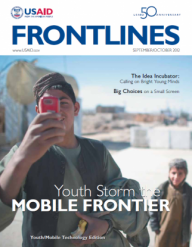

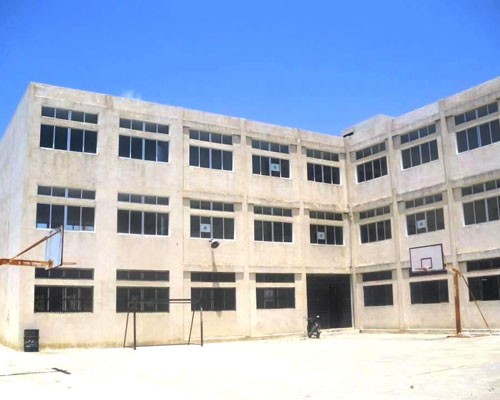
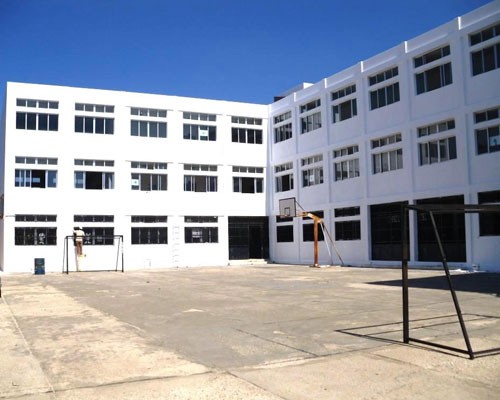
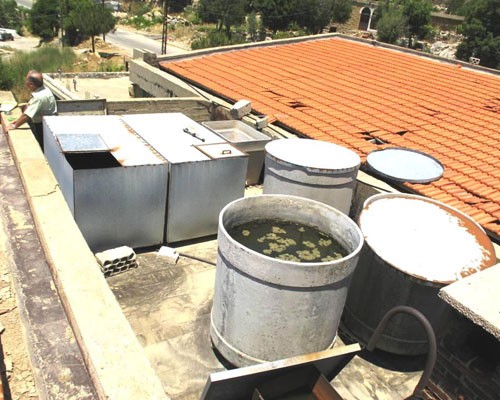
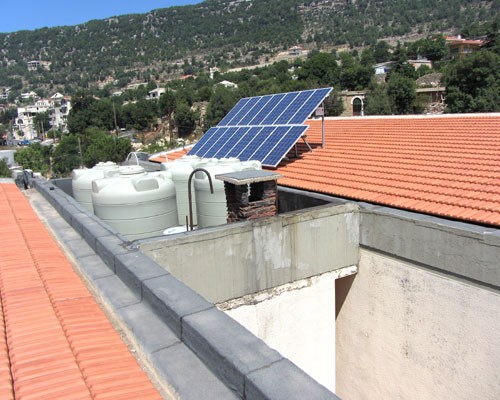
Comment
Make a general inquiry or suggest an improvement.